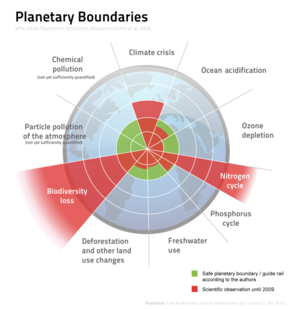Ecological crisis: Difference between revisions
From BurnZero
No edit summary |
No edit summary |
||
| Line 4: | Line 4: | ||
*'''Biodiversity loss''' - there has been a 68% average decline in the population sizes of mammals, birds, amphibians, reptiles, and fish between 1970 and 2016<ref>IPBES, Media Release, Nature’s Dangerous Decline ‘Unprecedented’; Species Extinction Rates ‘Accelerating’ May 2019</ref>. | *'''Biodiversity loss''' - there has been a 68% average decline in the population sizes of mammals, birds, amphibians, reptiles, and fish between 1970 and 2016<ref>IPBES, Media Release, Nature’s Dangerous Decline ‘Unprecedented’; Species Extinction Rates ‘Accelerating’ May 2019</ref>. | ||
*'''Deforestation''' - more than half the world’s tropical forests have been destroyed since the 1960s<ref>International Union for Conservation of Nature. (2021, February). ''Deforestation and forest degradation''. <nowiki>https://www.iucn.org/resources/issues-briefs/deforestation-and-forest-degradation</nowiki></ref>. | *'''Deforestation''' - more than half the world’s tropical forests have been destroyed since the 1960s<ref>International Union for Conservation of Nature. (2021, February). ''Deforestation and forest degradation''. <nowiki>https://www.iucn.org/resources/issues-briefs/deforestation-and-forest-degradation</nowiki></ref>. | ||
* Ocean acidification | * '''Ocean acidification''' - more CO2 in the atmosphere means more acidity in the oceans. | ||
* Ozone depletion | * Ozone depletion | ||
* Microplastics via overconsumption. | * Microplastics via overconsumption. | ||
Revision as of 06:15, 6 February 2022
We are rapidly heading towards crisis:
- Global temperatures - since records began in 1880, nineteen of the twenty hottest years have occured since 2000[1].
- Biodiversity loss - there has been a 68% average decline in the population sizes of mammals, birds, amphibians, reptiles, and fish between 1970 and 2016[2].
- Deforestation - more than half the world’s tropical forests have been destroyed since the 1960s[3].
- Ocean acidification - more CO2 in the atmosphere means more acidity in the oceans.
- Ozone depletion
- Microplastics via overconsumption.
- the nitrogen cycle
- the phosphorus cycle
These issues combined are accelerating us towards collapse.
References
- ↑ NASA, Global Temperature: https://climate.nasa.gov/vital-signs/global-temperature/
- ↑ IPBES, Media Release, Nature’s Dangerous Decline ‘Unprecedented’; Species Extinction Rates ‘Accelerating’ May 2019
- ↑ International Union for Conservation of Nature. (2021, February). Deforestation and forest degradation. https://www.iucn.org/resources/issues-briefs/deforestation-and-forest-degradation
